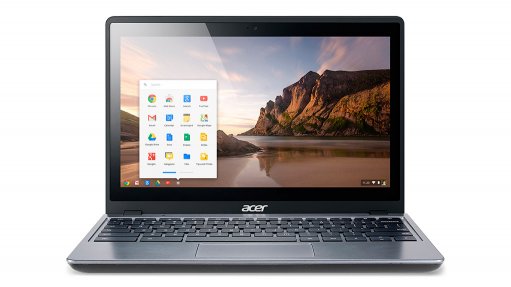
Tertiary education institutions can use search engine giant Google’s Chromebook to provide secure mobile end-point devices for students on which they can share documents, work collaboratively on documents and access education materials and applications being used in universities worldwide.
The devices run a specially designed version of the Chrome operating system and are designed to continue functioning seamlessly between offline and online modes when connectivity is available. Cloud System Documents can be stored in Google’s cloud, in a private cloud on university’s premises or in a hybrid public–private cloud system.
Students can easily access and share multimedia content, including textbooks, tutorial videos, class notes, library intranet resources and work projects. This improves collaboration and access to materials, as the devices will synchronise documents produced collaboratively when they have access to connectivity, says educational software company Grove Group Africa GM Johann de Wet.
Hardware and electronics manu- facturer Acer is the first original equipment manufacturer in South Africa to be granted permission by Google to sell the Chromebooks as part of a single, centrally managed cloud-based content and end-point devices system for tertiary institutions.
The Chromebook is an 11.6-inch display lightweight Notebook and has a robust, solid-state 16 GB or 32 GB hard drive that boots up in seven seconds. Cyber security is ensured by a Trusted Platform Module chip, which generates and stores cryptographic keys.
All the Chromebooks receive 100 GB of storage space in Google’s cloud infrastructure for free and document backup is automatic. The Web-based device has been optimised for Wi-Fi connectivity on campuses and universal serial bus (USB) 2 and USB 3 ports enable external devices or storage to be connected, says Acer Europe, Middle East and Africa education programme lead Anna Artemyeva.
All updates are included in the initial cost and there are no licensing fees involved, which means a low total cost of ownership that matches the constrained budget requirements of tertiary institutions aiming to introduce new methods of learning, as well as those of students, she says.
“The University of South Africa has been testing the use of Chrome-book extensively for tertiary education, specifically with regard to distance learning, and Grove Group piloted the use of Google Apps for Education among full-time students at the University of the Western Cape. “Many of the Google education applications are used in top-tier universities worldwide,” notes Acer Africa commercial manager Paul Collins.
The devices and content can be centrally managed, which also enables the Chromebooks to be remotely located and wiped, if necessary, concludes Collins.